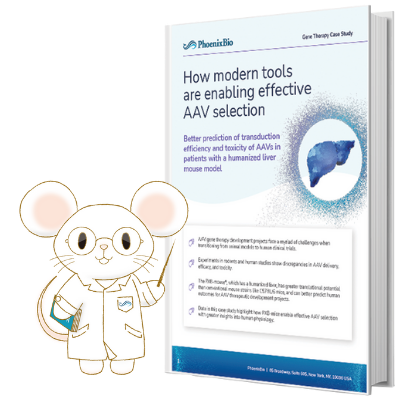Case study
Download the case study: How modern tools are enabling effective AAV selection

Adeno-associated virus (AAV) vectors are the leading platform for gene delivery to treat a variety of human diseases.
With numerous serotypes, AAVs offer a flexible way to target different tissue types in the body for a wide range of therapeutic needs.
But while AAV-based gene therapies have vast potential as human therapeutics, the success of ongoing and future projects depends on surmounting tremendous translational challenges and limitations in the preclinical stages of development.
In this case study, we discuss how PXB-mice with humanized livers are helping researchers overcome key obstacles when transitioning from animal models to human clinical trials.
Simply fill out the form to get your copy.